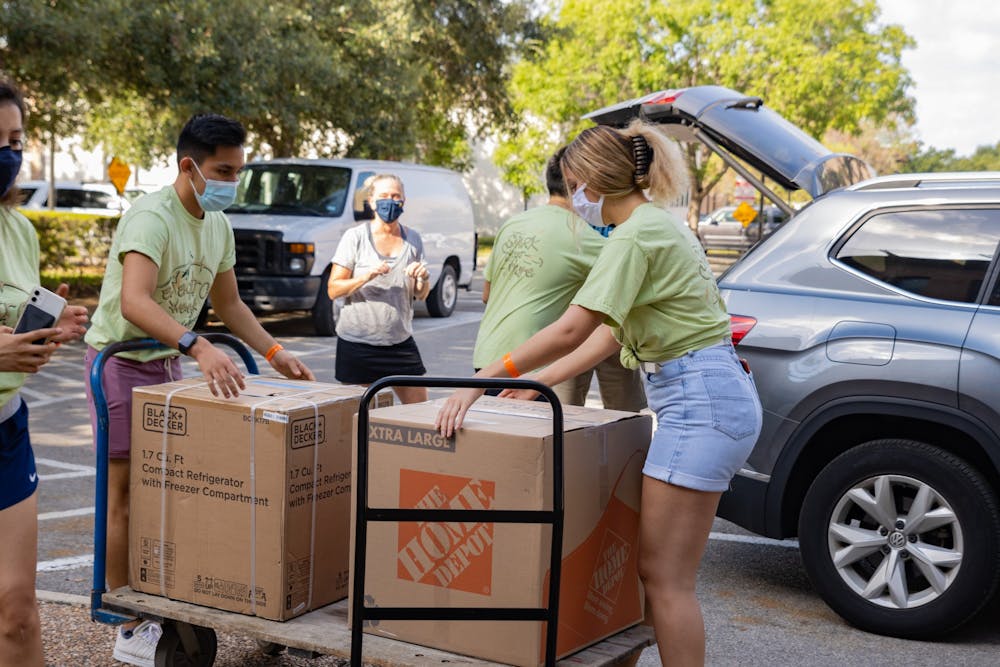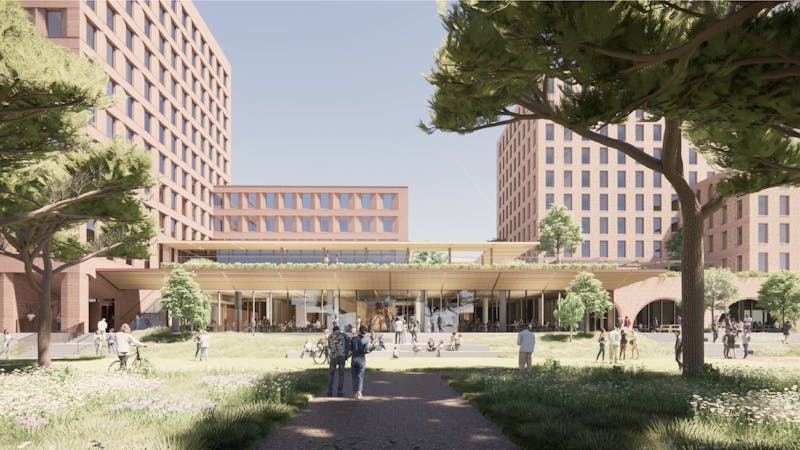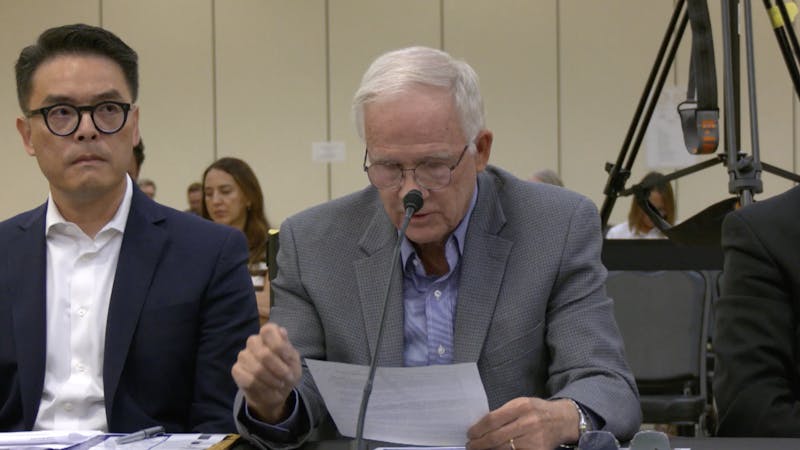Faculty Senate will meet to discuss risks and benefits of returning to campus

UPDATE 8/20/20: According to Faculty Senate Speaker Christopher Johns-Krull, the senate passed the following resolution after a nearly three-hour long meeting: “The Faculty of Rice University expresses its deep disappointment that in spite of the stated principle of ‘choice,‘ some faculty and staff members felt under pressure to be physically present on campus.”
The resolution will soon go to the full faculty for a ballot vote.
A special plenary meeting of the Faculty Senate will be held on Aug. 19 at 4 p.m. to discuss the risks and benefits of coming back to campus, following the creation of an online petition by computer science professor Moshe Vardi that received 94 faculty signatures.
According to its website, the Faculty Senate is the primary advisory body to the president on the university’s academic issues. A petition signed by 50 or more faculty members compels the speaker of the senate to call a meeting to discuss a specific matter.
Vardi says he created the petition because he felt the administration had not yet had an honest discussion with faculty about the risks and benefits of in-person teaching.
“The frustration now is that the voice of the faculty has not been heard,” Vardi said. “We are making life and death decisions. Rice has chosen to risk the lives of students, faculty, staff and even potentially the community around Rice … We have chosen a path that involves risk for a benefit that is questionable. And so far, the administration has not made a compelling case. In fact, I would argue, [they have] made no case whatsoever.”
Vice President for Administration Kevin Kirby said that faculty were all given the choice whether to teach in-person classes.
“We've been operating under a broad principle of choice,” Kirby said. “Everybody has different personal circumstances. Same for the faculty because people have different concerns. We gave all faculty the opportunity to teach remotely or to teach in person. And to the maximum extent we could for staff. We've had many staff working remotely over the summer, and some will continue to work remotely over the fall.”
Administrative town hall
A panel of several members of the administration held an hourlong town hall meeting to answer questions from faculty and staff on Aug. 3. According to Provost Reginald DesRoches, faculty, staff and students submitted over 200 questions over the prior week to be answered during the town hall.
During the town hall, President David Leebron said that one of the reasons Rice has not elected to go completely online is that due to learning style, community support, technology and environment, many students need to be on campus to be their most effective.
“Some have asked why the current environment, which is clearly worse now than it was in the spring, allows us to return. And much of that answer is in time to prepare,” Leebron said. “In this time we have really been able to make large investments, both in the quality of online learning and in the protective measures that prevent the spread of COVID-19.”
After attending the town hall, Vardi said it was “completely one-way.” He said he had wanted to hear expert-backed reasoning on why the benefits of going back to campus outweigh the risks. According to Kirby, the administration has consulted with “a lot” of experts both on and off campus as well as at peer institutions in formulating their plan for the fall semester.
“What we heard from the administration in the town hall meeting is, ‘We’ve consulted with faculty experts.’ These faculty experts, so far, are nameless,” Vardi said. “They have not come forward. They have not said, ‘My expertise is epidemiological testing and I support what Rice University is doing.’ I’d like to hear from some of our great teachers — I want them to tell me why they think that in-person teaching is so valuable under the concerns [under which we] have to operate.”
History professor Tani Barlow said she never felt like she had a voice in the decision-making process about classes this fall, despite the town hall and questionnaires sent by the Academic Restart Committee.
“Contemporary university administration is driven by factors that have nothing to do with education. This is industrywide,” Barlow said. “There has been no actual discussion with [the faculty], our creative ideas about teaching are ignored and the entire matter of holding classes on campus has been discussed by lawyers, professional administration and risk management.”
Barlow added that she still wonders about why Rice, unlike many peer institutions, has not gone fully online.
“[The reason] cannot be purely financial since Rice has a huge endowment relative to our size,” Barlow said. “None of these discussions are shared with faculty, and that is silly since we are bright and able to process complex ideas.”
Norman Fischer, a cello professor and the director of chamber music at the Shepherd School of Music, said that he thinks the leadership in charge of the fall semester has been doing their best at directing what he feels is a “complicated situation.”
“I feel that the command structure around decision-making at Rice was one that needed to be lithe and flexible, quickly adapting to new information and informing the campus,” Fischer said. “Clearly there are some faculty that would have wanted to be at the center of this situation, but I had the sense that [the Crisis Management Advisory Committee] was representative and responsible.”
According to Vardi, the university relies on the faculty’s advisory voice for many other major decisions, such as the decision of whom to give tenure, based on the principle of shared governance.
“A university is not a corporation,” Vardi said. “Legally, yes, you can run it completely top down, but … we don't usually run it like this because the basic principle of how [a] university is run is trusting the expertise of faculty members. The faculty voice is purely advisory, but I would say in 99 percent of cases, the president follows the recommendation [of] the faculty because they have the expertise in the matter.”
Vardi said that in addition to inviting a more thorough discussion on risks and benefits of returning to campus, the plenary meeting will hopefully also serve as a clearer indication on whether there is a general consensus among the faculty on this issue.
“The people who communicate with me are very often people who agree with me,” Vardi said. “[Maybe] many people disagree with me and maybe that’s what we’re going to hear in the faculty meeting.”
Teaching classes: in-person or remote?
During the town hall meeting, Leebron repeatedly emphasized that individual choice was being given to both faculty members and students with regards to how they will teach and attend classes.
All classes with enrollments greater than 25 students were made fully online on July 1, but faculty teaching smaller classes could request to also move their classes fully online. 59 percent of classes this semester, which equates to 25 percent of the total credit hours accounting for class sizes, will be delivered in-person, according to a July 28 email sent by Leebron.
In an letter to the editor published in the Thresher last month, Vardi wrote about the risks to safety posed by coming back to campus; in another letter published four days later, English professor Helena Michie questioned the benefits of in-person teaching, stating that it would be considerably different from the in-person experiences of semesters past.
Barlow said she requested to teach in person in the fall on the condition that Rice provide her with full medical personal protective equipment. According to Barlow, Rice declined her request.
“The decision to test and trace is not a substitute for full masking as per hospital protocols,” Barlow said. “We recommend condoms to our students because it is a barrier to transmission of [sexually transmitted infections] and we know it. By analogy the cheapest, most effective, easiest prevention method is hospital grade [personal protective equipment] for all faculty and staff.”
According to Kirby, Rice generally has accommodated most requests for personal protective equipment.
“Generally we're not turning down people for personal protective equipment,” Kirby said. “The only thing I know that we're being careful about is how we hand out the N95 masks, because not everyone needs one. I don't know of any case where people have been turned down and there's no reason for us to do that. We've been buying a lot of stuff and, maybe at one point our stock level was low or something like that, but to turn down somebody, we wouldn't do that.”
Vardi said he had initially planned on teaching in person, but changed his mind when he reflected on the logistics of teaching in a socially distanced classroom.
“I just don't believe in the educational rationale, not when I imagined the mechanics of actually sitting there [in the classroom]. Trying to talk on Zoom, you know, like this —” he covers his face up with a mask — “it doesn’t make sense.”
According to Vardi, offering in-person classes that will differ so wildly from what students are used to is “emotional manipulation,” aside from classes with a logistical need for in-person instruction like labs, visual arts or music.
“All of us are deprived for human contact, and so the promise of in-person teaching gives us an allure … [that] it’s going to be almost normal,” Vardi said. “It’s not going to be normal.”
Fischer said that although he has been teaching all his students online over the summer, he will return to teach in person in the fall.
“Music instruction has traditionally been a discipline taught one-on-one. Students come to the Shepherd School to study with a particular faculty member, and that bond is very strong,” Fischer said. “At the core, no matter how great the technology, there is no substitute for actually hearing the sounds in a space. And I can’t wait to hear it!”
According to Fischer, his new studio in the Brockman Hall for Opera has the latest quality air filtration and purification systems. He added that students and faculty will all be taking distancing precautions as much as they can.
“Naturally everyone will be practicing distancing and wearing masks whenever possible,” Fischer said. “As a string player, my students and I can do this all the time, but my wind and voice colleagues will have different challenges. Dean [of Music] Robert Yekovich and the Houston Symphony have commissioned a study concerning transmission of droplets from singers, woodwind and brass players, and I am certainly eager to hear those results.”
Matthew Bennett, a professor of biosciences and bioengineering, said he will be teaching classes completely remotely, including mentoring of graduate students.
“I have found that my interactions with students have adapted well to online learning, and I believe the learning outcomes are equivalent,” Bennett said. “I know we would all prefer in-class experiences, but I just don’t see a reason to take the risk for my classes.”
Culture of Care
Bennett, who is also a Will Rice College magister, said that his biggest concern about this upcoming fall semester involves the Culture of Care agreement that every undergraduate and graduate student was mandated to sign.
“If students buy into it, then we as a university have a chance to get through this. If not, then things could go south very quickly,” Bennett said.
Dean of Undergraduates Bridget Gorman said in the town hall meeting that the Culture of Care agreement will be enforced through different avenues depending on the severity of an infraction. Minor level infractions will be enforced by the newly formed COVID-19 Community Court, while Gorman and Student Judicial Programs “can and will” investigate larger issues that display more egregious violations of the agreement and impose sanctions that potentially include rustication.
However, Gorman said that she is impressed by how students have strictly adhered to the agreement during Orientation Week.
“I've been very impressed with how seriously students are taking rules on masking. I think I'm still seeing some evidence that people are trying to figure out how to find the mask that's the most comfortable for them,” Gorman said. “[Physical distancing] is just the trickiest to do, because we all have that natural distance that we're accustomed to standing next to people, and now we have to make it bigger. So I see that people are trying, but we're gonna have more work to do to get it exactly where we want it.”
Vardi said he thinks it is “hypocritical” of the university to mandate students to sign the Culture of Care agreement.
“[The] university is taking risks, and then tell[ing] the students, ‘you must be very, very responsible,’” Vardi said. “If we expect students to have a Culture of Care, shouldn’t the administration also demonstrate a Culture of Care?”
According to Barlow, Rice should focus on creating social, academic and civic alternatives to suit the novel current situation rather than trying to recreate social experiences of formerly “normal” life.
“What about saying to … students, you are not lacking a normal experience, you are encountering and dealing with a singular experience, an unusual experience, a true emergency, so how creatively can you invent ways of coping with the fallouts?” Barlow said. “Because my specialization is Chinese history, I have studied how other people have confronted and dealt with crises and social threats. We can learn from the past in order to create better ways of living during this time.”
[8/20/20 8:05 p.m.] This article has been updated to include the resolution passed after the special plenary meeting of the Faculty Senate.
Editor-in-chief Rishab Ramapriyan contributed to this story.
More from The Rice Thresher

Rice announces Chao College as 12th residential college
Rice announced that the 12th residential college will be named Ting Tsung and Wei Fong Chao College Aug. 19. The college, set to open in fall 2026, will contain nearly 300 on-campus beds.
Dining access fund announced following on-campus unlimited meal swipes
Rice announced new food assistance programs on Tuesday to account for the controversial change in the on-campus meal swipe plan.

Rice disaster prediction model discussed at hearing on deadly Central Texas floods
The House and Senate Select Committees on Disaster Preparedness and Flooding held a hearing on July 31 in Kerrville to address the deadly July 4 flooding in Central Texas. The flooding along the banks of the Guadalupe River killed 108 people, including 37 children. In the charged hearing, Texas lawmakers and flood survivors criticized the local response to the disaster.


Please note All comments are eligible for publication by The Rice Thresher.